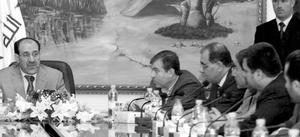Observers say Maliki has alienated potential supporters.
By Ned Parker
Los Angeles Times

Prime Minister Nouri al-Maliki (left) meets with Iraqi governors in Baghdad in a photo released by the Iraqi government. Maliki's Cabinet is filled with officials who are estranged from each other and more loyal to their parties than to the government as a whole. Some are jostling to unseat Maliki.
BAGHDAD, Iraq - Iraqi Prime Minister Nouri al-Maliki and Tariq Hashimi, the country's Sunni vice president, faced each other across the room as the Sunni leader spoke angrily of the bad blood festering between Sunni and Shiite officials.
The room hushed as Hashimi demanded to know whether the prime minister had been accusing his political bloc of being infiltrated by terrorists.
"Are you talking about us? If you are . . . we would ask for proof," said Hashimi, according to his account of a recent closed-door meeting of Iraq's top political and national security officials. "I am treated as an opponent," he said, his voice rising. "If you continue treating me like this, it is better for me to quit."
Maliki sat, silent.
Iraq's government is teetering on the edge. Maliki's Cabinet is filled with officials who are deeply estranged from each other and more loyal to their parties than to the government as a whole. Some are jostling to unseat the prime minister. Few, if any, have accepted the basic premise of a government whose power is shared among each of Iraq's warring sects and ethnic groups.
more:
http://www.philly.com/inquirer/world_us/20070610_Iraqi_prime_minister_isolated__beleaguered.html